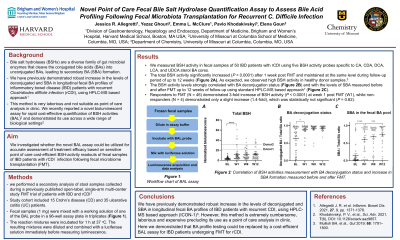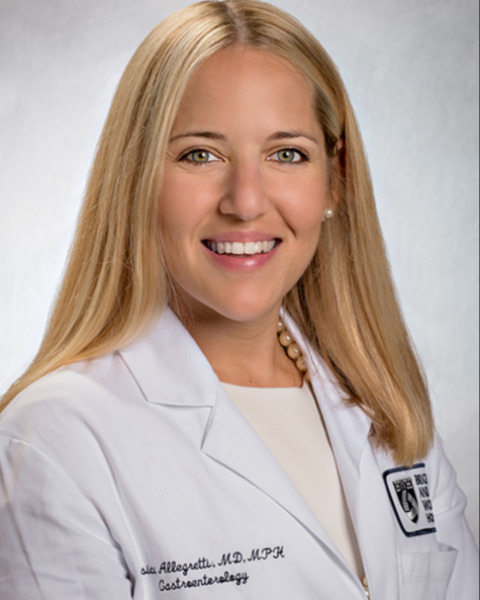Sunday Poster Session
Category: IBD
P0711 - Novel Point of Care Fecal Bile Salt Hydrolase Quantification Assay to Assess Bile Acid Profiling Following Fecal Microbiota Transplantation for Recurrent C. difficile Infection
Sunday, October 22, 2023
3:30 PM - 7:00 PM PT
Location: Exhibit Hall


Jessica R. Allegretti, MD, MPH
Brigham and Women's Hospital, Harvard Medical School
Boston, MA
Presenting Author(s)
Jessica R.. Allegretti, MD, MPH1, Pavlo Khodakivskyi, PhD2, Yezaz A.. Ghouri, MD3, Emma McClure, BA4, Elena Goun, PhD5
1Brigham and Women's Hospital, Harvard Medical School, Boston, MA; 2University of Missouri at Columbia, Columbia, MO; 3University of Missouri School of Medicine, Columbia, MO; 4Brigham and Women's Hospital, Boston, MA; 5University of Missouri, Columbia, MO
Introduction: Bile salt hydrolases (BSHs) are a diverse family of gut microbial enzymes that cleave the conjugated bile acids (BAs) into unconjugated BAs, leading to secondary BA (SBA) formation. We recently reported a novel bioluminescent assay for rapid cost-effective quantification of BSH activities (BAL) and demonstrated its use across a variety of biological settings. We investigated whether the novel BAL assay could be utilized for accurate assessment of treatment efficacy based on sensitive noninvasive BSH-activity readouts of fecal samples of IBD patients with recurrent Clostridiodes difficile infection (CDI) following fecal microbiome transplantation (FMT).
Methods: Using our novel optical BAL assay, we performed a secondary analysis of stool sample collected during a previously published open-label, single-arm multi-center study (ICON-1), where IBD patients with recurrent CDI were prospectively treated with FMT. Stool samples were collected before FMT and at week 1, 8 and 12 post-FMT along with clinical information. The BA profile of the samples were analyzed using routine HPLC-MS based approach. In the current study, we performed BSH activity quantification of the stool samples using BAL assay probes specific for cholic (CA), deoxycholic (DCA), lithocholic (LCA), chenodeoxycholic (CDCA) and ursodeoxycholic acid (UDCA), sterol cores. The data were compared with BA profiling from the original study and the BAL measurements of the stool samples of the healthy FMT donors.
Results: We measured BSH activity in fecal samples of 50 IBD patients, including 35 ulcerative colitis (UC) and 15 Crohn’s disease (CD) phenotype against five BAL probes. The total BSH activity significantly increased after 1 week post FMT and maintained at the same level during follow-up period of up to 12 weeks (Figure 1A). The BSH activity levels strongly correlated with BA deconjugation status measured before and after FMT up to 12 weeks of follow-up (Figure 1B). Furthermore, the BSH activity measurements also correlated with increase in SBA formation (Figure 1C).
Discussion: We have previously demonstrated robust increase in the levels of deconjugated BAs and SBAs in longitudinal fecal BA profile of IBD patients with recurrent CDI, using HPLC-MS based approach. However, this method is extremely cumbersome, laborious and expensive precluding its use as a point of care analysis in clinic. In this study, we demonstrated that BA profile test could be replaced by cost-efficient BAL assay for IBD patients undergoing FMT for CDI.

Disclosures:
Jessica R.. Allegretti, MD, MPH1, Pavlo Khodakivskyi, PhD2, Yezaz A.. Ghouri, MD3, Emma McClure, BA4, Elena Goun, PhD5. P0711 - Novel Point of Care Fecal Bile Salt Hydrolase Quantification Assay to Assess Bile Acid Profiling Following Fecal Microbiota Transplantation for Recurrent C. difficile Infection, ACG 2023 Annual Scientific Meeting Abstracts. Vancouver, BC, Canada: American College of Gastroenterology.
1Brigham and Women's Hospital, Harvard Medical School, Boston, MA; 2University of Missouri at Columbia, Columbia, MO; 3University of Missouri School of Medicine, Columbia, MO; 4Brigham and Women's Hospital, Boston, MA; 5University of Missouri, Columbia, MO
Introduction: Bile salt hydrolases (BSHs) are a diverse family of gut microbial enzymes that cleave the conjugated bile acids (BAs) into unconjugated BAs, leading to secondary BA (SBA) formation. We recently reported a novel bioluminescent assay for rapid cost-effective quantification of BSH activities (BAL) and demonstrated its use across a variety of biological settings. We investigated whether the novel BAL assay could be utilized for accurate assessment of treatment efficacy based on sensitive noninvasive BSH-activity readouts of fecal samples of IBD patients with recurrent Clostridiodes difficile infection (CDI) following fecal microbiome transplantation (FMT).
Methods: Using our novel optical BAL assay, we performed a secondary analysis of stool sample collected during a previously published open-label, single-arm multi-center study (ICON-1), where IBD patients with recurrent CDI were prospectively treated with FMT. Stool samples were collected before FMT and at week 1, 8 and 12 post-FMT along with clinical information. The BA profile of the samples were analyzed using routine HPLC-MS based approach. In the current study, we performed BSH activity quantification of the stool samples using BAL assay probes specific for cholic (CA), deoxycholic (DCA), lithocholic (LCA), chenodeoxycholic (CDCA) and ursodeoxycholic acid (UDCA), sterol cores. The data were compared with BA profiling from the original study and the BAL measurements of the stool samples of the healthy FMT donors.
Results: We measured BSH activity in fecal samples of 50 IBD patients, including 35 ulcerative colitis (UC) and 15 Crohn’s disease (CD) phenotype against five BAL probes. The total BSH activity significantly increased after 1 week post FMT and maintained at the same level during follow-up period of up to 12 weeks (Figure 1A). The BSH activity levels strongly correlated with BA deconjugation status measured before and after FMT up to 12 weeks of follow-up (Figure 1B). Furthermore, the BSH activity measurements also correlated with increase in SBA formation (Figure 1C).
Discussion: We have previously demonstrated robust increase in the levels of deconjugated BAs and SBAs in longitudinal fecal BA profile of IBD patients with recurrent CDI, using HPLC-MS based approach. However, this method is extremely cumbersome, laborious and expensive precluding its use as a point of care analysis in clinic. In this study, we demonstrated that BA profile test could be replaced by cost-efficient BAL assay for IBD patients undergoing FMT for CDI.

Figure: Figure 1: Correlation of BSH activities measurement with BA deconjugation status and increase in SBA formation measured before and after FMT. (A) Quantification of total BSH activities using novel bioluminescent BAL assay at baseline (BL) and at week 1, 8, and 12 after FMT Dotted lines refer to the total BSH activity level for healthy FMT donors. (B) BAs deconjugation status and (C) SBAs proportion in BAs pool in fecal samples of IBD patients with CDI before and after FMT.
Disclosures:
Jessica Allegretti: Abbvie – Consultant, Speakers Bureau. Adiso Therapeutics – Consultant. Artizan – Consultant. Artugen Therapeutics – Consultant. Baccain – Consultant. Bristol-Myers Squibb/Celgene – Consultant, Speakers Bureau. Ferring Pharmaceuticals – Consultant. Finch Therapeutics – Consultant. Iterative Scopes – Consultant. Janssen – Consultant, Grant/Research Support, Speakers Bureau. Merck – Consultant, Grant/Research Support. Morphic – Consultant. Pandion Therapeutics – Consultant. Pfizer – Consultant, Grant/Research Support. Roivant Sciences – Consultant. Seres Therapeutics – Consultant. Servatus – Consultant. Summit – Consultant.
Pavlo Khodakivskyi indicated no relevant financial relationships.
Yezaz Ghouri indicated no relevant financial relationships.
Emma McClure indicated no relevant financial relationships.
Elena Goun indicated no relevant financial relationships.
Jessica R.. Allegretti, MD, MPH1, Pavlo Khodakivskyi, PhD2, Yezaz A.. Ghouri, MD3, Emma McClure, BA4, Elena Goun, PhD5. P0711 - Novel Point of Care Fecal Bile Salt Hydrolase Quantification Assay to Assess Bile Acid Profiling Following Fecal Microbiota Transplantation for Recurrent C. difficile Infection, ACG 2023 Annual Scientific Meeting Abstracts. Vancouver, BC, Canada: American College of Gastroenterology.
